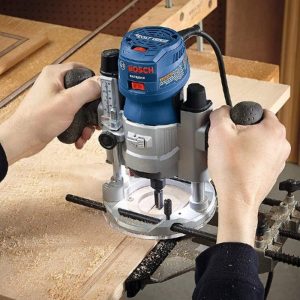 Bring the tool to the project instead of the project to the tool! Portable woodworking power tools open up endless opportunities. Whether you’re a master craftsperson or new to woodworking, you’ll need some essential woodworking power tools for your projects. Shapes, sizes, and costs will vary. There are corded and cordless versions of most of these tools as well. With advances in battery technology, sometimes a cordless version might be better than a corded one. When it comes time to drill, drive, cut, plane, join, route or sand, you’ll reach for one of these power tools.
Bring the tool to the project instead of the project to the tool! Portable woodworking power tools open up endless opportunities. Whether you’re a master craftsperson or new to woodworking, you’ll need some essential woodworking power tools for your projects. Shapes, sizes, and costs will vary. There are corded and cordless versions of most of these tools as well. With advances in battery technology, sometimes a cordless version might be better than a corded one. When it comes time to drill, drive, cut, plane, join, route or sand, you’ll reach for one of these power tools.
Drill and Driver Combo
Any beginner should start with a drill and driver combo as their first power tools. A drill and impact driver are each useful in their own way, but it’s much cheaper and more convenient to buy them together. That way you avoid multiple batteries/chargers laying around your shop.
The DeWalt 20-Volt Max Lithium Ion Drill Driver/Impact Driver Combo Kit is an excellent choice for any woodworker out there. These models feature a compact and lightweight design, LED lights, and ergonomic handles for comfort and control. The kit also includes two 1.3 amp-hour (Ah) batteries, a battery charger, and a carrying bag.
Router
A router is one of the most versatile woodworking tools in the shop and my go-to. By spinning cutters or bits at speeds between 6,000 and 24,000 revolutions per minute (RPM), a router can create slots and grooves, shape edges, straighten material, and even make joinery.
Routers are powerful, usually rated between 1-3/4- and 3-1/4-horsepower (hp). Each comes with 1/4-inch and 1/2-inch collets for bits with different-sized shafts. If a fence is added, the router tracks along the board’s edge or a plunge base allows precise depth cutting.
The variable-speed Makita D-Handle Router features a 2-1/4-hp motor and a comfortable pistol-grip handle for extra stability. It comes with a smooth start system, trigger lock button, and sturdy grip that can be adjusted for right-handers and lefties.
Palm Router
A palm router is smaller and less powerful than a full-sized router, making it ideal for edge details, beveling and other light tasks. The first versions of this tool were called trim routers because cabinetmakers used them when trimming laminate on countertops. However, it soon became apparent a lightweight one-handed router would be useful.
The small base plate improves visibility, and the lower torque makes the tool easier to control. The Bosch Colt 1.25 HP Variable-Speed Palm Router Combination Kit offers lots of features, including an edge guide and separate fixed and plunge bases.
Sander
Most projects involve some smoothing of wood, and random orbital sanders are the practical way to accomplish this. Available in five- and six-inch diameters, these sanders feature abrasives discs that attach to the sanding pad with hook-and-loop or a sticker-like adhesive.
The Bosch Sander’s soft body reduces vibration and takes hook-and-loop abrasives with eight holes for dust collection. The unit features a variable speed dial and dust filter system. It can connect to your shop vac for larger sanding jobs.
Planer
The old saying goes, “Bring the material to the tool, or the tool to the material.” This is definitely the case here! Handheld power planers aren’t necessary for every shop, but they’re invaluable for flattening rough lumber, fitting doors, and straightening studs.
It takes patience and a lot of elbow grease to operate a traditional hand plane for these types of tasks. A tool like the DeWalt 3-1/4-Inch Hand Planer, which spins at 34,000 rpm and can take up to a 1/16-inch-deep cut, can complete these tasks in no time. Plus, when blades wear out you can replace or sharpen them inexpensively.


